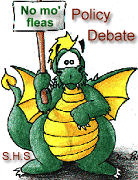Pointing
Out Problems:
Debaters don't always do the "right thing." Some of
these "mistakes" are innocent, and sometimes they're
not. Some "mistakes" are minor - some are severe. In
all cases, a debater should gently point out the problem and move
on with the debate. Never stop a speaker, never make a big deal
out of a problem, and never, never get rude or obnoxious. Most
judges will take the appropriate action if the
"mistake" is brought to their attention.
Return to top
Return to main directory
Procedure
Standards:
- Falsification Of Evidence:
If one debater suspects a speaker of making up evidence,
then the debater should ask for the evidence card. If the
speaker doesn't have the card or the card does not
contain the required citation, the problem should be
raised in the next speech. If it is at the end of the
round, the debater may still ask for the card. (make sure
you gently do this within the hearing of the judge). If
you cannot prove the evidence if falsified, don't raise
the issue.
- Evidence Card Requirements:
Evidence used during a round must be written, it must be
made available upon request, and it should have the
following source information at minimum: author's name
and qualifications, source name, date of publication, and
page number.
- Passing Notes to A Speaker:
Passing notes to a debater who is speaking is not allowed
in U.I.L. tournaments. Each debater is expected to carry
his own load.
- Not Presenting Plan In 1AC:
"Strategies for Success: a Student's gGuide to
Cross-Examination Debate," Treva Dayton, ed., The
plan must be delivered in the 1AC. Waiting until the 2AC
prevents the 1NC from addressing the full affirmative
case and places an undue burden on the 2NC.
- Withholding Attacks:
some negatives will withhold their main attacks until the
2NC giving the affirmative less time to refute their
arguments. If this occurs, ask the 2NC why they withheld
their attacks? Gently and politely point out to the judge
that the negative was hedging their attacks and deal with
it the best you can. (don't use up all of your prep time
before the 2AC.)
- New Issues In Rebuttals:
all issues, contentions, and arguments must be presented
in one of the four constructions. Bringing up a new issue
in the rebuttal places an unfair burden on the opposition
to refute the issue within the limited rebuttal time.
Debaters may use new evidence to support old arguments.
The penalties for bringing up new issues range from loss
of the issue to loss of the round.
- Dropped Issues: a
debater drops an issue when he fails to discuss that
issue in a rebuttal. Technically, once an issue is
dropped that team may not address the issue in their next
rebuttal. Generally, dropping an issue will result in
losing that issue. For the negative, a dropped issue is
survivable; for the affirmative, it frequently will
result in loss of the round.
- Rapid Fire: rapid
fire occurs when a debater speaks so fast that he cannot
be understood and/or the judge cannot keep up with the
flow. Many judges will simply stop listening when a
speaker rapid fires or he may not flow the arguments. The
minimum penalty for rapid fire is generally a loss of
speaker points. When an opponent rapid fires, it may be
unwise to point this problem out. (you may sound like
you're whining and incompetent.) Clarify confused issues
during C-X.
- Interaction with Judges:
interaction with a debate judge should be limited to
cordiality and listening to any oral critiques he chooses
to provide after the round. A debater is never to
question a judge's decision unless the judge initiates
the conversation and brings the question up first.
- Strategic Trickery:
a few affirmatives base their entire position on avoiding
issues and bending normal debate procedures - they win on
trickery. There is a fine line between what is acceptable
strategy and what is unacceptable. The only recourse a
debater has is to point out the difficulty and hope the
judge will also recognize the problem.
Return to top
Return to main directory
